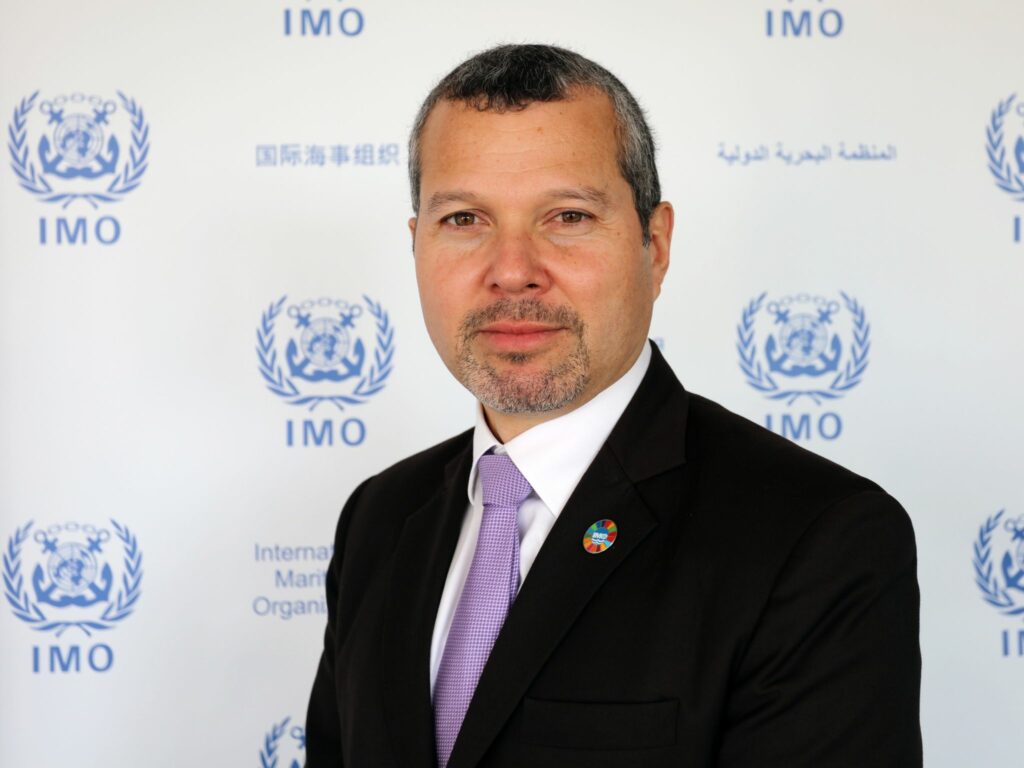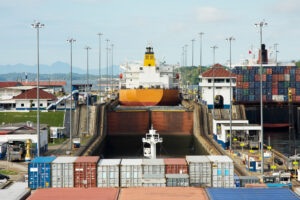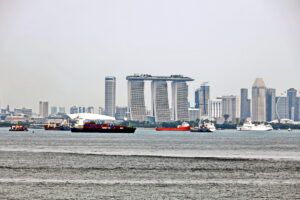
Photo credit: IMO / Image: IMO secretary-general Arsenio Dominguez
The carbon tax proposal aimed at reducing global greenhouse gas emissions from the international shipping sector is not perfect, but it provides an orderly shift to a greener industry, the IMO chief said on Tuesday.
“The IMO Net-Zero Framework is not perfect. However, it provides a balanced basis for our further work on a number of elements ahead of its entry into force in 2027,” the IMO secretary-general Arsenio Dominguez said at the opening of the second extraordinary session of the Marine Environment Protection Committee on October 14.
Nations are meeting at the International Maritime Organization (IMO) headquarters through Friday. Earlier this year, IMO member states agreed on the contents of the regulatory framework. The aim is to adopt it at this meeting.
In his address to the Committee, the IMO chief addressed increasingly vocal opposition to the carbon pricing mechanism by saying it will cut costs in the long run and avoid regional and national climate measures.
“The energy and digital transition of shipping have already started. However, the absence of global regulations will increase the costs of this transition in the long run. It will incite a proliferation of regional and national climate measures leading to inefficiency and a myriad of emissions pricing schemes, without IMO – all of you the Member States – or the industry having a say in how to use the collected revenue. Prolonged uncertainty will put off investments and diminish confidence in IMO, your Organization,” said Arsenio Dominguez during his opening remarks at the meeting.
The IMO chief is asking member states of the International Maritime Organization to support adopting regulations to transition to green shipping.
“The IMO Net-Zero Framework is a set of goal-based provisions. No specific fuel or technology has been excluded from the Net-Zero Framework as compliance option. I am confident that the various proposals that have already been submitted regarding the reward, fuel certification, well-to-wake emissions, or the fund will address remaining concerns and provide additional certainty,” the IMO secretary-general noted.
Some IMO member states intervened to express their concerns about the IMO’s Net-Zero Framework.
During the opening session on Tuesday, Arsenio Dominguez highlighted: “I am aware that some of you may find the outcome not climate ambitious enough, and would have liked to see steeper reduction curves to effectively contribute to reducing global warming. Others, believe that the GFI reduction requirements are overly stringent and will place a burden on the shipping industry.
“Some of you are of the view that there will not be sufficient alternative fuels available to ensure compliance, whilst others believe that robust global regulations will send a clear demand signal to fuel and energy producers. Some of you would have preferred a stronger commitment to supporting developing States. Others would prefer additional support for early-movers.
“All these views continue to be valuable. And also during this week all these different positions will be respected.”
The IMO aims for consensus in decision-making but it’s likely nations will vote on adopting the regulations.
Seven leading shipping associations have called for the IMO to adopt the Net-Zero Framework (NZF) at the critical extraordinary session of the IMO marine environment protection committee this week (14-17 October). Anything else would be a major setback for the green transition, they say, and risk leaving the industry with a complicated patchwork of regional climate regulations.
In a joint statement, seven associations – Japanese Shipowners’ Association, Royal Belgian Shipowners’ Association, Royal Association of Netherlands Shipowners, Singapore Shipping Association, UK Chamber of Shipping, Norwegian Shipowners’ Association, and Danish Shipping – warned that failure to adopt the NZF would leave the industry facing a complicated and inefficient patchwork of national and regional regulatory frameworks.
The International Chamber of Shipping (ICS) and European Shipowners (ES | ECSA) have also issued, among other leading associations and organizations, declarations of support for the Net-Zero Framework.
On the contrary, the Trump administration unequivocally rejects the proposal and has threatened to retaliate if nations support it, setting the stage for a fight over the climate deal.
Greek shipowners also voiced strong support for decarbonization in the first day of Maritime Cyprus 2025 Conference on October 6, in Limassol, but warned that the current pace of regulation risks prioritizing taxation over real progress.
George Procopiou, chairman of Dynacom Tankers Management called for “doable, not desirable” measures, including slower steaming, carbon capture, and greater technical efficiency, while Semiramis Paliou, CEO of Diana Shipping emphasized that shipping’s share of global emissions remains small and that excessive costs will ultimately reach consumers.
Dr. John Coustas, president and CEO at Danaos Corporation cautioned that regional measures such as the EU Emissions Trading System threaten competitiveness and urged closer consultation between the IMO and industry.
Thanassis Martinos, managing director at Eastern Mediterranean Maritime criticized the EU’s framework as “unfair and disruptive,” arguing that it penalizes ships for voyage segments outside European waters.
The second day of the Maritime Cyprus 2025 Conference on October 7 brought together international industry leaders for discussions spanning insurance, ownership and chartering trends.
Four shipowners were invited to express their views on how they are adapting to uncertainty around decarbonization, regulation and technological change.
John A. Xylas, president and CEO at Ariston Navigation Corp. reaffirmed the industry’s support for a single global regulatory framework under the IMO, describing it as essential for predictability and fairness.
Polys V. Hajioannou, CEO, chairman and director at Safe Bulkers cautioned that the cost of compliance inevitably passes through the supply chain, reiterating that shipowners remain willing to adapt but require realistic timelines and balanced measures.
Filippos Efstathiou, CEO at Efnav Company Ltd stressed the importance of operational efficiency and prudent investment, warning that acting prematurely on unproven technologies risks “investing against a moving target.”
Capt. Stephanos E. Angelakos, CEO at Angelakos (Hellas) S.A. emphasized that seafarers remain the backbone of the industry, calling for sustained investment in training, welfare and retention.



